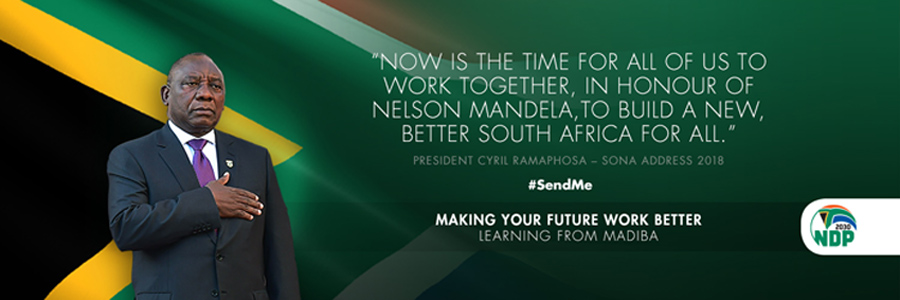From the Union Buildings

It was former Deputy Chief Justice Dikgang Moseneke who said: “Land is not just an issue of economic or commercial importance – it has meaning at many levels. It is very spiritual. It is in land that we bury our people, we connect and speak to our ancestors. It is land on which churches, temples and mosques are built and it is from land that we eat and survive.”
It was in this context that the National Assembly adopted a motion on land expropriation without compensation in February this year. Following this resolution, a Constitutional Review Committee has been established to consider the legal and economic aspects of expropriation without compensation.
The committee will also consider whether it is necessary to amend the Constitution to allow for the expropriation of land without compensation.
The Constitutional Review Committee must report back to Parliament by 30th August 2018.
According to a recent land audit report less than 4 percent of private rural land and less than 7 percent of private urban land is owned by Black South Africans.
Since 1994, the democratic government has embarked on a series of interventions to advance land reform, including restitution, redistribution and tenure reform.
While more than 3 million hectares of land was restored between 1995 and 2014, the land audit report into private land indicates that whites still own around 72 percent of the farms owned by individuals, coloureds 15 percent, Indians 5 percent and Africans only 4 percent.
Land is central to human existence. For millennia it has supported life, enabled the creation and development of societies and made economic activity possible.
It is fundamental to the dignity and well-being of our people. The dispossession of the land of the indigenous people of this country is therefore the original colonial sin that continues to constrain the realisation of the potential of our people.
The return of the land to those who work it is fundamental to the transformation of our society and it is critical if we are to improve the lives of the poor.
Government is committed to accelerate the pace of land reform. Government is also committed to ensuring that land distribution is done in a measured manner.
Let us refrain from occupying land illegally. Nobody has any right to invade land to violate other people’s rights. Instead let us work together to find just equitable and lasting solutions.
Land expropriation without compensation must be done within the confines of the law. We want to return the land to our people in an orderly way, in terms of our laws, in terms of our Constitution, so that everybody’s rights are protected and advanced.
We will handle this matter in the same way we have handled all difficult issues our country has had to handle.
We will always seek to do what is in the interests of our people.
Throughout this process, we need to work together, guided by the needs of the poor and landless.
A new dawn must mean we do things in a proper way, without any fraud, corruption or violating the law.
In this, the Year of Nelson Mandela, we need to work together to ensure his vision for land reform is realised. As government we are committed to the implementation of a comprehensive land reform programme that corrects the historical injustice of land dispossession, provides land to the poor in both rural and urban areas, strengthens the property rights of all, increases agricultural production and improves food security.
As I indicated in the State of the Nation Address, government will undertake a process of broad consultation to determine the modalities of the implementation of this mechanism.
All South Africans are and must participate in the debate about land and come up with solutions and proposals that will help take the country forward.
It is up to all of us to engage with one another to drive for meaningful and sustainable land reform.
There is a strong case to be made that the use of expropriation without compensation in certain circumstances to advance land reform is entirely consistent with the provisions of the Constitution.
We will need to determine, collectively, how we can implement this measure in a way that promotes agricultural production, improves food security, advances rural development, reduces poverty and strengthens our economy.
For it to serve this purpose, we will need to locate this measure within a broad and comprehensive land redistribution and agricultural development programme.
It is our collective responsibility to use the provisions of the Constitution more effectively and more directly to drive land reform with greater urgency and purpose. We should not reduce the enormous task of land reform to a debate on expropriation without compensation.
During the process of consultation and engagement, we must review the full extent of our land reform programme since 1994, identifying where there have been shortcomings and undertaking measures to strengthen policies and programmes.
This is an inclusive process one that requires responsibility and maturity from all South Africans.
Did you know
The Joint Constitutional Review Committee set up to review Section 25 of the Constitution to make it possible for the state to expropriate land without compensation, will soon start on an extensive public participation process.
The committee will publish advertisements for oral and written submissions from the public. The public will have a month to respond after which the committee will visit three to four districts or local municipalities per province for public hearings.
The public hearings are proposed to start on 8 May 2018 in Limpopo.



 Facebook
Facebook Twitter
Twitter WhatsApp
WhatsApp